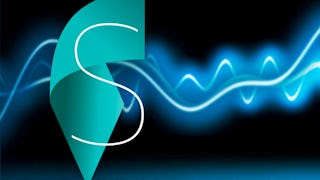Digital Signal Processing is the branch of engineering that, in the space of just a few decades, has enabled unprecedented levels of interpersonal communication and of on-demand entertainment. By reworking the principles of electronics, telecommunication and computer science into a unifying paradigm, DSP is a the heart of the digital revolution that brought us CDs, DVDs, MP3 players, mobile phones and countless other devices.

Cultivate your career with expert-led programs, job-ready certificates, and 10,000 ways to grow. All for $25/month, billed annually. Save now


Digital Signal Processing 1: Basic Concepts and Algorithms
This course is part of Digital Signal Processing Specialization


Instructors: Paolo Prandoni
53,734 already enrolled
Included with 
(618 reviews)
What you'll learn
The nature of discrete-time signals
Discrete-time signals are vectors in a vector space
Discrete-time signals can be analyzed in the frequency domain via the Fourier transform
Details to know

Add to your LinkedIn profile
4 assignments
See how employees at top companies are mastering in-demand skills

Build your subject-matter expertise
- Learn new concepts from industry experts
- Gain a foundational understanding of a subject or tool
- Develop job-relevant skills with hands-on projects
- Earn a shareable career certificate


Earn a career certificate
Add this credential to your LinkedIn profile, resume, or CV
Share it on social media and in your performance review

There are 4 modules in this course
Introduction to the notation and basics of Digital Signal Processing
What's included
6 videos7 readings1 assignment2 ungraded labs1 plugin
Modeling signals as vectors in an appropriate vector space. Using linear algebra to express signal manipulations.
What's included
7 videos6 readings1 assignment1 ungraded lab1 plugin
The fundamental concepts behind the Fourier transform and the frequency domain
What's included
14 videos10 readings1 assignment3 ungraded labs1 plugin
Delving deeper in the world of Fourier analysis.
What's included
11 videos9 readings1 assignment2 ungraded labs1 plugin
Instructors

Offered by
Recommended if you're interested in Electrical Engineering


École Polytechnique Fédérale de Lausanne


École Polytechnique Fédérale de Lausanne


École Polytechnique Fédérale de Lausanne


École Polytechnique Fédérale de Lausanne
Why people choose Coursera for their career




Learner reviews
618 reviews
- 5 stars
69.57%
- 4 stars
20.06%
- 3 stars
5.82%
- 2 stars
1.61%
- 1 star
2.91%
Showing 3 of 618
Reviewed on Aug 26, 2020
Course was very interesting and the quizzes were tough but you definitely learn a lot.
Reviewed on May 19, 2021
Thank you! I got a basic idea regarding digital signal processing and why we prefer digital signals and real-life problems are really cool.
Reviewed on Dec 13, 2022
lack of many details, but it's very good for taking the introduced concepts in useful different perspective, and get its intuition meaning

Open new doors with Coursera Plus
Unlimited access to 10,000+ world-class courses, hands-on projects, and job-ready certificate programs - all included in your subscription
Advance your career with an online degree
Earn a degree from world-class universities - 100% online
Join over 3,400 global companies that choose Coursera for Business
Upskill your employees to excel in the digital economy
Frequently asked questions
Access to lectures and assignments depends on your type of enrollment. If you take a course in audit mode, you will be able to see most course materials for free. To access graded assignments and to earn a Certificate, you will need to purchase the Certificate experience, during or after your audit. If you don't see the audit option:
The course may not offer an audit option. You can try a Free Trial instead, or apply for Financial Aid.
The course may offer 'Full Course, No Certificate' instead. This option lets you see all course materials, submit required assessments, and get a final grade. This also means that you will not be able to purchase a Certificate experience.
When you enroll in the course, you get access to all of the courses in the Specialization, and you earn a certificate when you complete the work. Your electronic Certificate will be added to your Accomplishments page - from there, you can print your Certificate or add it to your LinkedIn profile. If you only want to read and view the course content, you can audit the course for free.
If you subscribed, you get a 7-day free trial during which you can cancel at no penalty. After that, we don’t give refunds, but you can cancel your subscription at any time. See our full refund policy.
More questions
Financial aid available,

